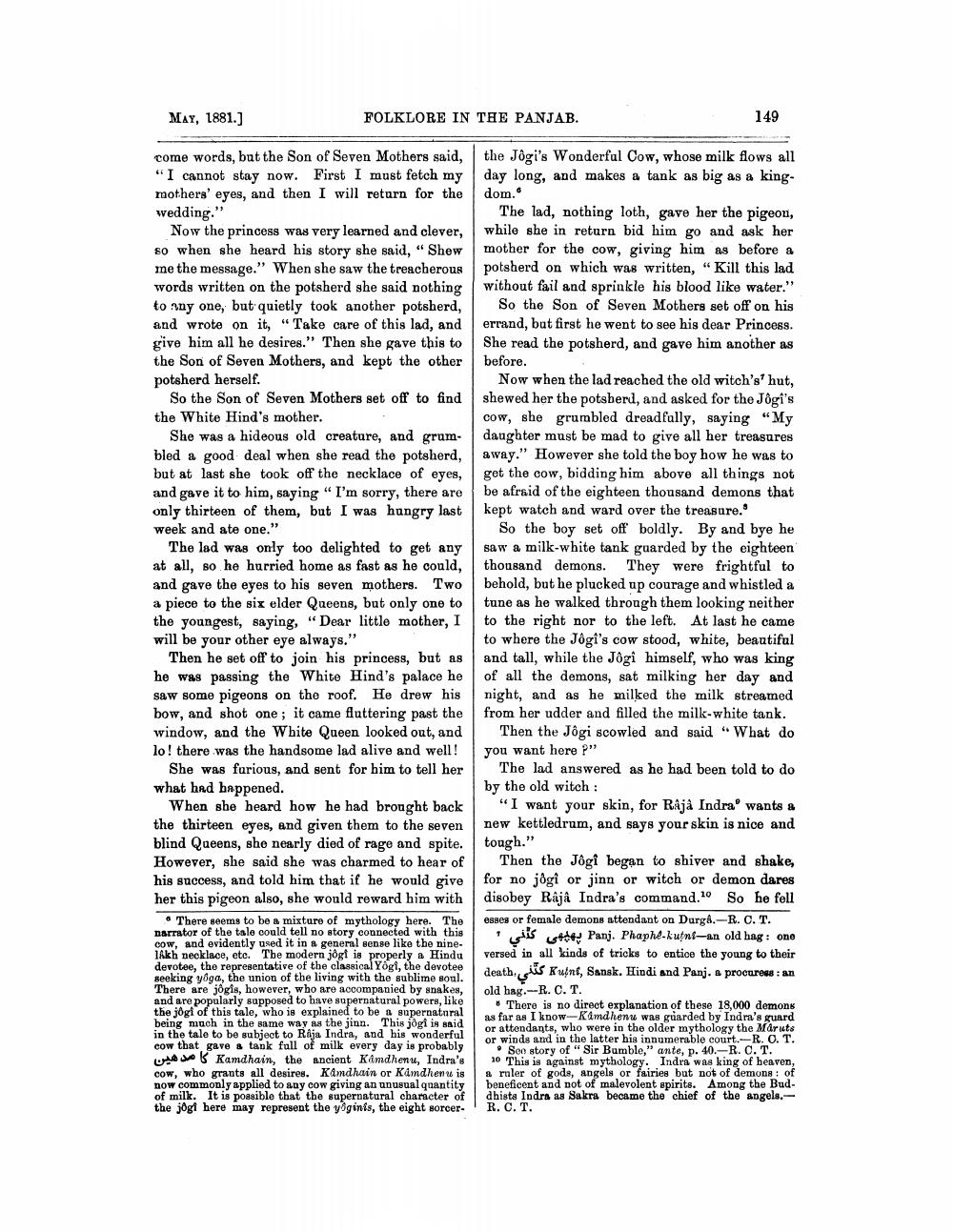________________
MAY, 1881.]
FOLKLORE IN THE PANJAB.
149
come words, but the Son of Seven Mothers said, "I cannot stay now. First I must fetch my mothers' eyes, and then I will return for the wedding."
Now the princess was very learned and clever, 80 when she heard his story she said, "Shew me the message." When she saw the treacherous words written on the potsherd she said nothing to any one, but quietly took another potsherd, and wrote on it, "Take care of this lad, and give him all he desires." Then she gave this to the Son of Seven Mothers, and kept the other potsherd herself.
So the Son of Seven Mothers set off to find the White Hind's mother.
She was a hideous old creature, and grumbled a good deal when she read the potsherd, but at last she took off the necklace of eyes, and gave it to him, saying "I'm sorry, there are only thirteen of them, but I was hungry last week and ate one."
The lad was only too delighted to get any at all, so he hurried home as fast as he could, and gave the eyes to his seven mothers. Two a piece to the six elder Queens, but only one to the youngest, saying, "Dear little mother, I will be your other eye always."
Then he set off to join his princess, but as he was passing the White Hind's palace he saw some pigeons on the roof. He drew his bow, and shot one; it came fluttering past the window, and the White Queen looked out, and lo! there was the handsome lad alive and well!
She was furious, and sent for him to tell her what had happened.
When she heard how he had brought back the thirteen eyes, and given them to the seven blind Queens, she nearly died of rage and spite. However, she said she was charmed to hear of his success, and told him that if he would give her this pigeon also, she would reward him with
• There seems to be a mixture of mythology here. The narrator of the tale could tell no story connected with this cow, and evidently used it in a general sense like the nine1Akh necklace, etc. The modern jogi is properly a Hindu devotee, the representative of the classical Yogi, the devotee seeking yôga, the union of the living with the sublime soul. There are jõgis, however, who are accompanied by snakes, and are popularly supposed to have supernatural powers, like the jõgi of this tale, who is explained to be a supernatural being much in the same way as the jinn. This jogi is said in the tale to be subject to Raja Indra, and his wonderful
cow that gave a tank full of milk every day is probably U S B Kamdhain, the ancient Kamdhenu, Indra's
cow, who grants all desires. Kamdhain or Kamdhenu is now commonly applied to any cow giving an unusual quantity of milk. It is possible that the supernatural character of the jógi here may represent the yoginis, the eight sorcer.
the Jõgi's Wonderful Cow, whose milk flows all day long, and makes a tank as big as a kingdom.
The lad, nothing loth, gave her the pigeon, while she in return bid him go and ask her mother for the cow, giving him as before a potsherd on which was written, "Kill this lad without fail and sprinkle his blood like water."
So the Son of Seven Mothers set off on his errand, bat first he went to see his dear Princess. She read the potsherd, and gave him another as before.
Now when the lad reached the old witch's' hut, shewed her the potsberd, and asked for the Jogi's cow, she grumbled dreadfully, saying “My daughter must be mad to give all her treasures away." However she told the boy how he was to get the cow, bidding him above all things not be afraid of the eighteen thousand demons that kept watch and ward over the treasure."
So the boy set off boldly. By and bye he saw a milk-white tank guarded by the eighteen thousand demons. They were frightful to behold, but he plucked up courage and whistled a tune as he walked through them looking neither to the right nor to the left. At last he came to where the Jogi's cow stood, white, beautiful and tall, while the Jogi himself, who was king of all the demons, sat milking her day and night, and as he milked the milk streamed from her udder and filled the milk-white tank.
Then the Jogi scowled and said "What do you want here?"
The lad answered as he had been told to do by the old witch:
"I want your skin, for Raja Indra wants a new kettledrum, and says your skin is nice and tough."
Then the Jogi began to shiver and shake, for no jogi or jinn or witch or demon dares disobey Raja Indra's command. So he fell esses or female demons attendant on Durg&.-R.C.T.
siis **Panj. Phaphe-kutni-an old hag : one versed in all kinds of tricks to entice the young to their deaths Kulnt, Sansk. Hindi and Panj. a procureus : an old hag.--R.C.T.
There is no direct explanation of these 18,000 demons as far as I know-Kamdhenu was guarded by Indra's guard or attendants, who were in the older mythology the Måruts or winds and in the latter his innumerable court.-R.O.T.
See story of " Sir Bumble," ante, p. 40.-R.C.T. 10 This is against mythology. Indra was king of beaven, a ruler of gods, angels or fairies but not of demons: of
beneficent and not of malevolent spirits. Among the Bud|dhista Indra as Sakra became the chief of the angels.
R..T.




